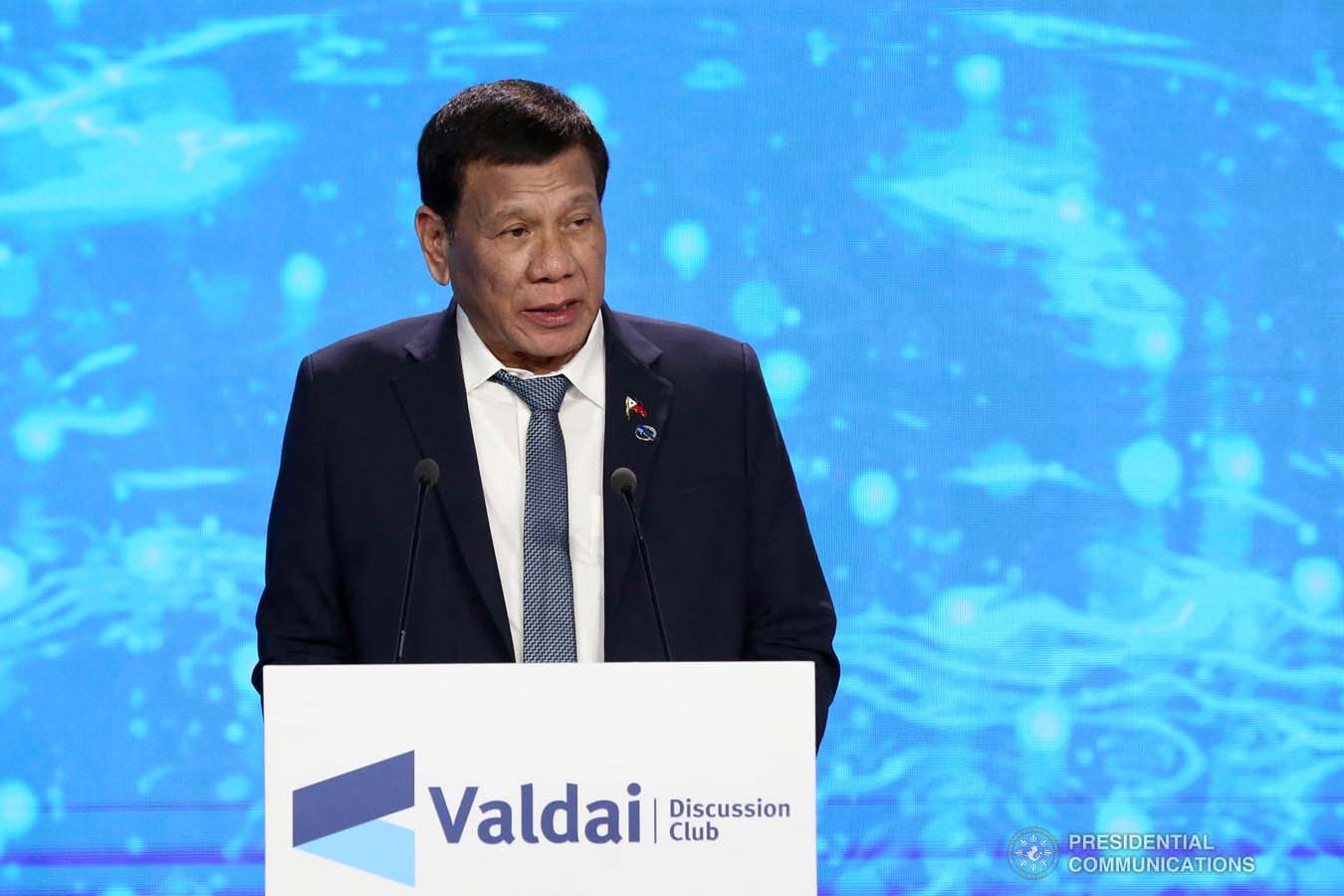
SOCHI, Russia—President Rodrigo Roa Duterte on Thursday underscored the importance of mutual respect for independence, sovereignty, and equality among nations during his speech at the Plenary Session of the Valdai Discussion Club here.
“What we seek — as I assume what the Russian people and all nations also desire — is fairness, equality, and mutual respect. We want a strengthened rules-based order where countries, big or small, are treated the same,” President Duterte said before hundreds of foreign experts attending one of Russia’s most prominent think tanks.
“We want unimpeded freedom—guaranteed by our Constitution—to exercise our right to govern ourselves as a people and as we saw it fit. And we want friends and partners to respect our independence to make sovereign decisions just as we respect theirs,” he added.
The Chief Executive stressed the importance of a nation’s independence, noting developing countries, like the Philippines, face different challenges and problems that would require different sets of solutions.
The principles of respect for state sovereignty, non-intervention, and peaceful resolution of disputes must be upheld at all times, otherwise the order unravels, he said.
“This is crucial especially now with the rise of new powers and the relative decline of the old,” he added, noting that the geopolitical shift was a challenge to the current global order.
In the remaining three years of his term, President Duterte said he wants to expand the horizon of Philippine diplomacy by deepening engagement in Latin America, Africa, and Central Asia.
“It is also high time that the Philippines looked at the Middle East with fresh eyes going beyond oil and Overseas Filipino Workers,” he added.
“As one of the fastest growing economies in the world, the Philippines will assume our twin responsibility of sustaining the growth of our people, while helping other developing countries in their own journey to progress,” he said.
His government, he said, will strengthen economic ties with these regions to open new markets and provide benefits for the country through free exchange of ideas, technology, and innovation.
Parochialism and isolationism, he said, have no place in a world that is getting smaller and smaller by the day, stressing nations have to embrace their shared destiny if they were to overcome the existential challenges of the current times.
The President, however, warned by saying, “But make no mistake. While we recognize the interdependence of nations, we hold fiercely sacrosanct our own independence.”
He also said that openness to cooperation without precondition is the answer to the serious threats the world is facing today such as terrorism, climate change, migration issues, refugee crisis, new pandemics, and looming shortages of vital resources.
Countries have no choice and they must act together to survive and prosper together. He suggested that instead of using these issues as tools to maintain the status quo — to make the rich richer and the poor poorer, countries must help each other.
“If we pursue genuine cooperation, we need not choose between sustaining development and protecting the environment, between promoting diversity and maintaining national identities, or between upholding human rights and preserving local social order,” he added.
Recognizing the role of the United Nations (UN), he called on the international body to step up and reinvigorate global efforts toward creative solutions commensurate to the complexity of the nations’ common problems.
“We all have a stake in a stable global order. In this period of flux, it is important that we expand our notion of ‘our selves’ to include others; that we choose the enduring power of persuasion over coercion; and that we follow the path of peace in order to achieve our shared and noble aspirations for our peoples,” he concluded.
During the question and answer session, President Duterte expressed the Philippines’ readiness to the explore trade and commerce with other countries aside from the United States, its long-time ally.
The President admitted that criticisms from a foreign government and human rights groups on his campaign against illegal drugs have prompted him to recalibrate the country’s foreign policy and start partnerships with other countries especially on trade, investment, and defense.
He vowed to continue his administration’s fight against illegal drugs, calling on the human rights to investigate first.
“Kindly be kind to your fellowmen. Before you condemn, investigate. And allow us — before you come up with these results — allow us the right to be heard. It is a God-given right to any person whether you live in autocracy or a tyranny, every person has the right to be heard,” he said. PND

